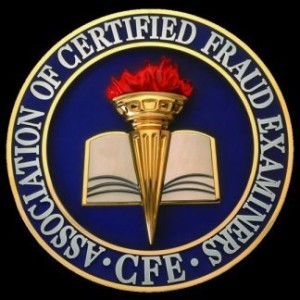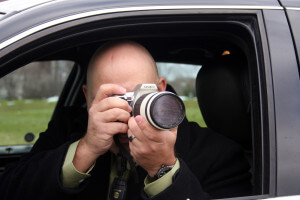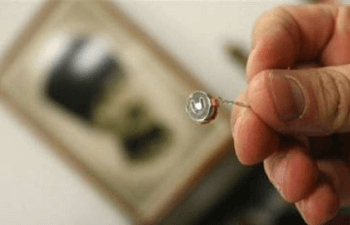A Certified Fraud Examiner, or CFE is a professional trained in detecting, investigating and resolving fraud cases. Certified Fraud Examiners usually have backgrounds in accounting and auditing, criminology or law. The CFE certification is awarded by the Association of Certified Fraud Examiners (the ACFE), the world’s largest anti-fraud organization and a provider of anti-fraud training and education.
Becoming a certified fraud examiner requires a bachelor’s degree and a number of years of professional experience in a relevant field. In addition, Certified Fraud Examiners must pass the CFE exam, adhere to the ACFE code of ethics, and provide references to show that they are of high moral character.
So What Does A Certified Fraud Examiner Do?
 So that’s a lot of technical stuff about how to become a Certified Fraud Examiner, but you’re probably wondering what does a CFE really do? Fraud, particularly corporate fraud is a complicated crime. Unlike a murder or theft, the average person might not know it when they see it. Fraud will usually just look like a pile of papers, electronic documents, numbers or accounting figures. It takes a trained professional to figure out something is really wrong. A Certified Fraud Examiner must use a combination of investigative techniques and accounting expertise to gather evidence, make sense of it, and later prove it in court.
So that’s a lot of technical stuff about how to become a Certified Fraud Examiner, but you’re probably wondering what does a CFE really do? Fraud, particularly corporate fraud is a complicated crime. Unlike a murder or theft, the average person might not know it when they see it. Fraud will usually just look like a pile of papers, electronic documents, numbers or accounting figures. It takes a trained professional to figure out something is really wrong. A Certified Fraud Examiner must use a combination of investigative techniques and accounting expertise to gather evidence, make sense of it, and later prove it in court.
Certified Fraud Examiners are responsible for exposing some of the biggest corporate scandals in history, including Cynthia Cooper, the whisleblower of the worldcom scandal and Harry Markopolos, the whisteblower of the Bernie Madoff scandal.
Are Private Investigators Certified Fraud Examiners?
 Private Investigators are usually not CFE’s, although they often work together to investigate fraud. A CFE might rather spend his time behind a desk reading over documents and making accounting calculations, while the investigator gets his hands dirty, going undercover, performing long hours of surveillance and diving in dumpsters to find the evidence that the CFE needs.
Private Investigators are usually not CFE’s, although they often work together to investigate fraud. A CFE might rather spend his time behind a desk reading over documents and making accounting calculations, while the investigator gets his hands dirty, going undercover, performing long hours of surveillance and diving in dumpsters to find the evidence that the CFE needs.
Private investigators may investigate some types of fraud by themselves. One example of this is insurance fraud. Proving insurance fraud may be a simple matter of taking a few photos to show that a person claiming to have a broken leg puts their crutches down and starts walking as soon as they think nobody’s looking. Proving corporate fraud on the other hand requires the involvement of a CFE to catch smart, careful white collar criminals who are very good at covering their own tracks. This is why Certified Fraud Examiners are an important part of any investigative team that seeks to uncover any complex fraud and corporate wrongdoing.




